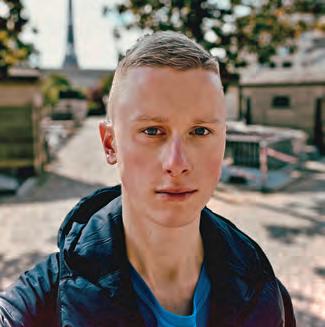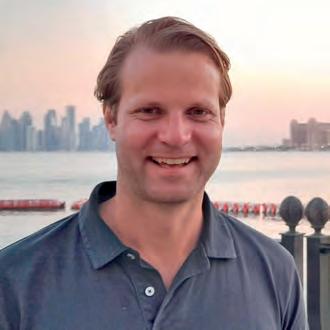
6 minute read
Perspectives
DANIEL ADAMSON (2014)
Daniel has recently completed his PhD at Durham University. Here, he tells us about his research, and how it led him to reflect on his time at The Perse.
What is Holocaust education for? Are current provisions enough?
These are the key questions at the heart of my PhD research. My research focuses on the different ways in which the complex British response to the Holocaust has been portrayed in educational settings. The crux of my thesis is that the relationship between Britain and the Holocaust has rarely been portrayed with adequate nuance, and that pressures on teaching time do not allow the topic the necessary space to be examined in meaningful depth.
As a Sixth Former, I became fascinated with the wider history of antisemitism. Encouraged by my Perse teachers, I pursued independent research on the Dreyfus affair (the 19th Century miscarriage of justice of a Jewish captain in the French Army, who was accused of treason). I studied History at the University of Cambridge where my undergraduate dissertation examined the relationship between Winston Churchill and the Holocaust: a connection which was marked by both action and apathy.
Following graduation in 2017, a year spent working as a history teacher in a secondary school sharpened my awareness of the debates surrounding Holocaust education. As I constructed schemes of work for pupils, it became apparent that there were myriad opinions of how best to teach about the Holocaust, and genocide in general. Subsequently, a Master’s in History Education at University College London provided an ideal opportunity to unite these twin subject interests. I was able to conduct captivating fieldwork relating to genocide education, which included a survey of Perse teachers’ experiences. Transitioning to a PhD was an unmissable chance to feed my intellectual curiosity.
I cannot recall a specific incident of being taught about the Holocaust whilst a Perse student myself. However, I realise that my schooling took place in an environment with rich links to Jewish history. In 1904, Hillel House (now the Pelican building) was established as one of only four Jewish boarding houses ever to have existed at independent schools in Britain. It housed boys directly affected by the horrors of the Holocaust – none more so than Josef Behrmann (1939). Between 1941 and 1945, Behrmann passed through some 14 camps in mainland Europe, and later testified at the Nuremburg Trials of Nazi war criminals. Behrmann’s legacy lives on at The Perse in a collection of Holocaust books donated to the School library, and the annual Behrmann Lecture around Holocaust Memorial Day continues to gather momentum. Holocaust education is a delicate practice. I hope that my work will promote at least some debate about how best the task of teaching and learning about the Holocaust might be approached. My thesis suggests that reconciling any “detachment” between the history of Britain and that of the Holocaust is a poignant reminder that Nazi persecution did not affect mainland Europe alone. Tackling complex topics also guards against the entrenchment of simplistic interpretations of the past.
Shifting social sands, such as growths in contemporary antisemitism, alter the lens through which we look back on the Holocaust. It is my belief that educators – including those at The Perse – must seek ways of retaining the centrality of the Holocaust in the classroom, whilst also adapting their pedagogy to best address changing modern circumstances. A duty perhaps easier said than done…

Living and Working in Qatar
JAMES CAFFALL (2000)
James left The Perse in 2000, and studied at the University of Oxford. He now works for the Commercial Bank of Qatar. In this piece, he reflects on the move to such a different country, and on the impact of the 2022 FIFA World Cup preparation on Qatar.
Ijoined the Prep in 1989 and went all the way through to Sixth Form in 2000. After reading Geography at Oxford University (with help to get there from Ed Elliott), I ended up working in London. I moved to Qatar in September 2010 and three months later it was announced the country would host the 2022 FIFA World Cup. 12 years on, it has been remarkable to see the country transform itself in preparation.
I soon noticed after relocating that most people back home know little about the country. Common questions include: “Can women drive?”, “Can you drink alcohol?”, and “Do western women need to cover up?” The answers to these are yes, yes and no, but there is more to know about a country that many people will only take notice of for the first time this year.
Qatar is a tiny Gulf country, about half the size of Wales, with a local population only about twice that of Cambridge. It is ruled by an Amir and is very wealthy thanks to liquified natural gas exports, giving it the highest GDP per capita in the world.
I have found the stereotype of Arab hospitality to be true, although it is rare to be invited to a Qatari’s house. While this may seem like the product of a closed society, the reality is that family comes first in Qatari culture and most social time is spent with relatives. I have been lucky enough to go to a number of Qatari majlises (male only meeting spaces that are separate to the main house) but my wife has been more successful at procuring invitations and even attended a number of weddings. I only have verbal reports on what these are like, as Qatari weddings are sex segregated, with separate male and female celebrations (often on different days) and mobile phone bans in force.
Qatar is the first Muslim and Arab country to host a World Cup. Critics think this is ridiculous as it does not have the same footballing heritage as, say, Europe. For Qatar, the World Cup is more about nation building than it is about staging football matches. The country has a “National Vision 2030”, which aims to create a more sustainable economy that is less reliant on hydrocarbon revenues. 2022 brought this deadline forward and the pace of development has been staggering. Since 2010, a new airport, a container port, an underground metro, a new city (Lusail – where the final will be played), hospitals, universities and massive infrastructure upgrades have all been built. This is all to create a country that can attract new people and businesses to facilitate a non-hydrocarbon future. The eight new stadiums are just the icing on the cake. Nation building from the World Cup also extends beyond the concrete. “Brand Britain” is so strong internationally in that people know quite a bit about us, whether through our history, arts, sports, TV, tourist attractions, politicians, or the Queen. Qatar does not have these things to the same extent. The World Cup is seen as important to strengthen a sense of national identity and to put the country on the global map. Increased international attention has been uncomfortable at times, however, especially regarding the mistreatment of migrant labourers. 2022 is undoubtedly a different World Cup, not least because it is in winter, all the stadiums are within 35 miles of the capital and alcohol is restricted to respect Islamic culture. Some people will embrace this difference and others will not. Regardless, the World Cup is a very big deal for a small country. And for Qataris, it is much more than just football.







